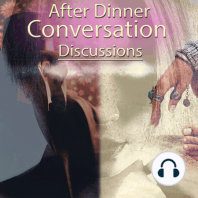33 min listen

E20. "How The Cockroach Lost Its Voice" - When cockroaches could talk, and humans were still unhappy.
E20. "How The Cockroach Lost Its Voice" - When cockroaches could talk, and humans were still unhappy.
ratings:
Length:
31 minutes
Released:
Jun 15, 2020
Format:
Podcast episode
Description
Named “Top 15 Podcast” for 2020!STORY SUMMARY: An older and younger (talking) cockroach climb to the top of the highest thing, the refrigerator, to overlook their world. The older roach tells the child that the humans he sees can talk, and also have a 3rd eye inside of them that allows them to imagine the future and remember the past, and this is what makes them unhappy all the time. An angel moth comes down and takes away the roaches ability to speak forever.DISCUSSION: A children’s story, but one with a good lesson, about having the ability to think about the future, but not let it trouble you or dwell on it. Do other animals have this “3rd eye”? Maybe dogs or others do, to some degree. It has made humans successful because we can remember errors, and plan for future problems. It’s a trade off, but a good one. The key is to not worry so much.BOOK LINK: Download the accompanying short story here.MAGAZINE: Sign up for our monthly magazine and receive short stories that ask ethical and philosophical questions.SUPPORT: Support us on Patreon.FOLLOW: Twitter, Instagram, Facebook
Released:
Jun 15, 2020
Format:
Podcast episode
Titles in the series (71)
E3. "The Shadow Of The Thing" - Would you take a pill that showed you the truth about the world?: "Would you take a pill that showed you the truth about the world?" Kolby, Jeremy, and Ashley discuss the ethics and morality of the choices made in the short story "The Shadow Of The Thing" by Tyler W. Kurt. by Philosophy | Ethics Short Story Discussions